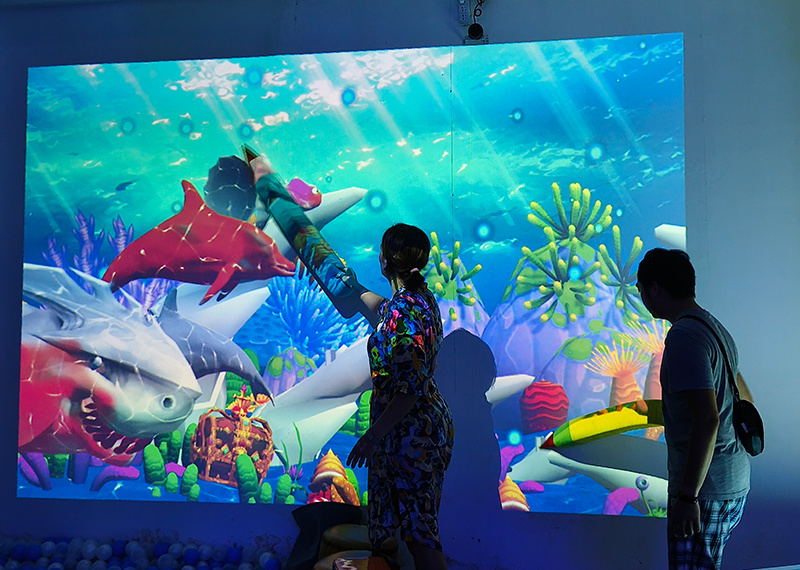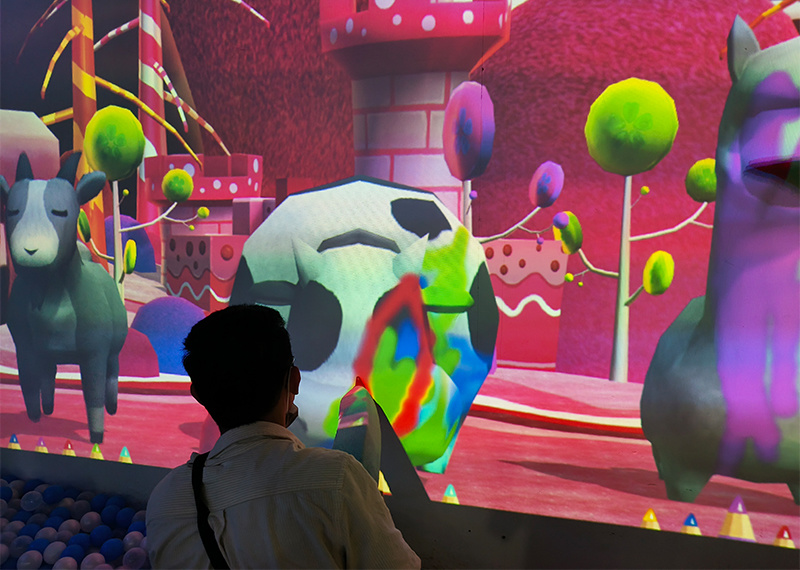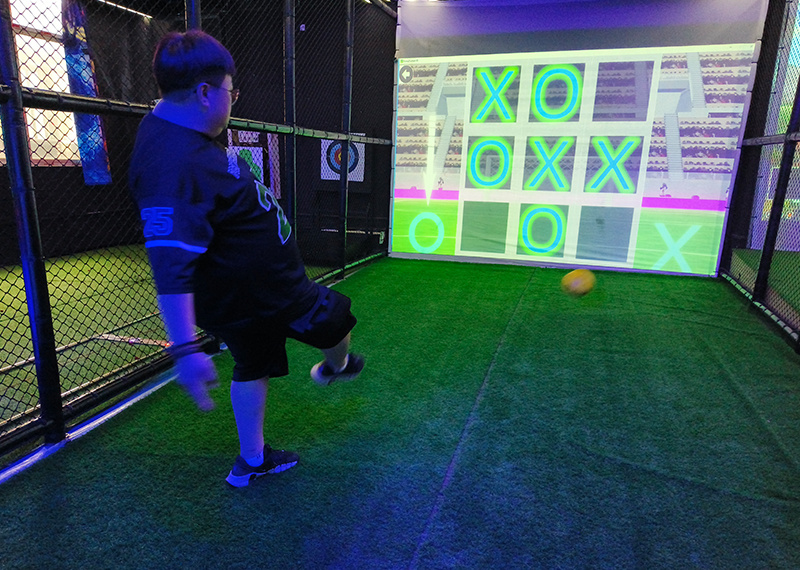What's the Cost of Developing Wall Interactive Projector Game Software?
Understanding Interactive Wall Projector Systems
Interactive wall projector systems have revolutionized how we interact with spaces, turning ordinary walls into immersive gaming environments. These systems typically include a projector, sensors, and custom software that work together to create an engaging experience.
But what exactly goes into creating an interactive wall game software? Let’s break it down.
Components of an Interactive Wall Projector System:
- Projector: The heart of the system, the projector casts images and animations onto a wall. The quality and type of projector (e.g., short-throw vs. long-throw) can significantly influence the overall cost.
- Sensors: These detect user movements and gestures, translating them into in-game actions. Advanced sensors might raise the price but offer greater precision and interaction.
- Software: The software ties everything together, enabling the interaction between the user and the projected content. Custom development wall projector game software often requires a bespoke approach, depending on the complexity of the game.
Understanding these components helps clarify why costs can vary widely. The next sections will delve deeper into the specific factors that affect the price.

Key Factors Influencing the Cost of Custom Development Wall Projector Games
When considering the cost of developing an interactive wall game , it's important to weigh several factors that play a significant role in the final price.
a. Complexity of the Game:
The more complex the game, the higher the development cost. For instance, a simple interactive wall drawing game for kids may involve basic animations and interactions. In contrast, a complex multiplayer game with advanced AI will require extensive coding, testing, and iteration.
b. Customization Needs:
Custom software development is often more expensive than off-the-shelf solutions. If you require unique features, specific branding, or tailored content, the cost will rise accordingly. Customization ensures the software meets your exact needs but demands more time and resources from the developers.
c. Technology Stack:
The technology used in developing the software, including the programming languages, frameworks, and tools, can also impact the cost. Utilizing the latest technologies often results in a more efficient and scalable product but may increase the upfront investment.
d. Integration with Existing Systems:
If the interactive wall projector game needs to integrate with other systems—such as an existing customer database, an emulator, or a point-of-sale system—additional costs will be incurred. Seamless integration ensures a smooth user experience but requires more development work.
e. Supplier or Manufacturer Selection:
Choosing the right supplier or manufacturer for your interactive wall projector system is crucial. Established suppliers often charge more but offer better support, warranties, and product quality. Opting for the best supplier can save costs in the long run by reducing maintenance and operational issues.
By considering these factors, you can better estimate the costs and make informed decisions about your project.

Estimating the Price: A Step-by-Step Guide
Now that we’ve covered the factors influencing the cost, let’s walk through a step-by-step guide to estimating the price of developing wall interactive projector game software .
Step 1: Define Your Project Scope
Start by clearly defining what you need. Are you developing an educational tool, an entertainment game, or a marketing application? What are the must-have features? Knowing your project’s scope helps in setting a realistic budget.
Step 2: Choose the Right Interactive Wall Projector System
Next, select a projector system that fits your needs. The system you choose will impact both the cost and the user experience. Consider whether you need a high-end, commercial-grade system or if a more affordable option will suffice.
Step 3: Consider the Development Timeframe
How quickly do you need the game developed? A tight deadline might require more developers or expedited services, which can increase costs. Planning ahead can help you avoid these additional charges.
Step 4: Obtain Quotes from Multiple Developers
Reach out to several development companies to get quotes. Compare the prices, but don’t just go for the cheapest option. Consider the quality of their previous work, their experience with interactive wall game software, and client reviews.
Step 5: Factor in Post-Development Costs
Don’t forget to budget for post-development costs, such as maintenance, updates, and potential future expansions. Investing in the latest technology from the start can reduce these costs over time.
By following these steps, you can create a detailed cost estimate that aligns with your budget and project goals.

Case Studies: Real-World Examples of Interactive Wall Games
To better understand the cost implications, let’s look at some real-world examples of interactive wall games and their associated costs.
Example 1: Interactive Wall Drawing Game for Kids
A children’s museum wanted to create an interactive wall drawing game that would allow kids to draw on a large wall using virtual crayons. The project required custom development to ensure that the game was intuitive, colorful, and engaging. The total cost for development, including hardware, was approximately $40,000.
Example 2: Retail Store Marketing Game
A retail store sought to develop an interactive wall game to attract customers and promote products. The game featured a series of mini-games, integrated with the store’s inventory system. The cost for this more complex project was around $75,000.
Example 3: Educational Tool for Schools
An educational institution developed a learning game that used an interactive wall to teach subjects like math and science. The game was designed to be used in classrooms across multiple locations, requiring scalable software and high-quality projectors. The total cost of development and implementation was close to $120,000.
These case studies highlight how the cost can vary based on the complexity and scope of the project. Each example reflects different use cases, helping you better gauge what your project might cost.

Maximizing Value: Tips for Cost-Effective Development
While developing interactive wall projector game software can be costly, there are ways to maximize value without compromising quality.
a. Start Small and Scale:
Consider launching a basic version of your game with essential features. Once it gains traction, you can invest in additional features or expansions. This approach allows you to test the market and get feedback before committing to a larger investment.
b. Leverage Existing Systems:
If possible, use existing systems or software that can be adapted to your needs. This could involve using an emulator for testing or incorporating open-source software to reduce development costs.
c. Work with Experienced Developers:
Choosing experienced developers who have a proven track record in interactive wall games can save you time and money. They’re likely to have encountered similar challenges before and can avoid common pitfalls, ensuring a smoother development process.
d. Negotiate with Suppliers:
When purchasing the hardware, don’t hesitate to negotiate with suppliers or manufacturers. They might offer discounts for bulk orders or long-term partnerships, helping you reduce costs.
e. Plan for Long-Term Maintenance:
Investing in high-quality development and hardware might cost more upfront, but it can reduce maintenance costs in the long run. Additionally, ensure you have a clear maintenance plan in place to keep the system running smoothly.
These tips can help you get the most out of your investment, ensuring that your interactive wall projector game software delivers lasting value.
FAQs
- Can I develop a wall interactive projector game myself? While it's possible, it requires significant technical skills and can be time-consuming. Consider hiring a professional development team to ensure a high-quality product.
- What are some popular wall interactive projector games? There are many popular games available, including drawing games, trivia games, and physical activity games.
- How can I monetize my wall interactive projector game? You can monetize your game through various methods, such as selling it directly, offering in-app purchases, or partnering with advertisers.

How Can Simulator Design Solutions Transform Sports & Fitness Game Zones?

What Is the Configuration, Structure, and Working Principle of VR Dynamic 7D Cinema?

VR Arcade Equipment Buying Guide: 5 Costly Mistakes Every New Owner Makes (2026 Edition)

Projector Configuration Requirements for Parent-Child Interactive Play Areas: What Do You Really Need to Get It Right?

How Do Indoor Football Simulators Enable Real Interaction Through Sensors?
Product details
Are glasses required to see a 5D film?
Audience needs to wear 3D glasses while watching movie, but not VR glasses.
Does the soccer simulator configuration include the curtain?
Yes, a 4-meter-wide, 3-meter-high projection curtain is included.
Standard and other
Are you an amusement park equipment manufacturer?
Yes. We have our own production factory, which is located in Guangzhou, China, covering an area of over 2,000 square meters. With our professional production team, we are able to ensure high quality and on-time delivery of our products. All products have undergone rigorous testing and quality inspection. You are welcome to visit our factory.
How long is the warranty period?
Our products have a one-year warranty period. During the warranty period, if there are any issues with the product that are not caused by human error, we can replace the parts for you free of charge. If the problems are caused by improper use, you will need to purchase the parts and bear the shipping costs yourself.
Do you offer installation services?
Our professional implementation team can provide equipment installation and debugging services to ensure smooth operation. Our installation services is chargeable and you can contact us in to inquire about the service fees.

Hottest activated LED dance grid tiles floor touch games
Super Grid is an immersive sports game that combines sports and technology. It integrates interactive LED lights and sensors through innovative software design, creating a fun gaming experience.

Top Indoor Tennis Racketball Training Simulator Dual Player Games
Interactive somatosensory fitness game
Combine traditional tennis sports with advanced 3D digital technology to bring customers an immersive tennis training experience
COMBINE TRADITIONAL TENNIS SPORTS WITH ADVANCED 3D DIGITAL TECHNOLOGY TO BRING CUSTOMERS AN IMMERSIVE TENNIS TRAINING EXPERIENCE INDOOR AND TENNIS EXPERIENCE HALL

Super Grid Interactive LED Floor Activate Game Team Play
Super Grid is an immersive sports game that combines sports and technology. It integrates interactive LED lights and sensors through innovative software design, creating a fun gaming experience.

Immersive 5D/7D/9D cinema dynamic visual experience room
Compared with other types of theaters, 5D/7D/9D cinema have high technical content, prominent themes, and have a strong impact on the characteristics of the picture. With the increasing demand in the entertainment market and the continuous development of video entertainment technology, in the past, audiences would experience vibration, drop, rain, scratches and other effects in some 4D theaters, but now with 5D theaters, audiences can experience new Unique features, touch and feel effects such asreal smoke, water, snow, bubbles, smell, lightning, leg touch,camera system and more. When the audience is watching amovie, the seats and environmental effects will change into corresponding actions according to the development of the movie,allowing the audience to experience an immersive viewing experience.
Get in Touch With JAMMA
Would you like to learn more about indoor & outdoor playground equipment?
We would be happy to help you and find the best solution for your needs.

